 EFFEXOR (venlafaxine)
EFFEXOR (venlafaxine)
What is it:. Effexor is an antidepressant in a group of drugs called selective serotonin and norepinephrine reuptake inhibitors (SSNRIs). Effexor works by restoring the balance of certain natural substances in the brain, which helps to improve certain mood problems.
Use: Effexor is used to treat major depressive disorder, anxiety, and panic disorder.
Side Effects: Call your doctor at once if you have any of these serious side effects: increased blood pressure (severe headache, blurred vision); easy bruising or bleeding; severe blistering, peeling, and red skin rash; very stiff (rigid) muscles, high fever, sweating, fast or uneven heartbeats, tremors, overactive reflexes; nausea, vomiting, diarrhea, loss of appetite, feeling unsteady, loss of coordination; or headache, trouble concentrating, memory problems, weakness, confusion, hallucinations, fainting, seizure, shallow breathing or breathing that stops. Less serious Effexor side effects may include: drowsiness, dizziness, feeling nervous; dry mouth; mild nausea, constipation; decreased sex drive, impotence, or difficulty having an orgasm; blurred vision; increased appetite; or changes in weight.
Precautions:. Do not take Effexor if you are allergic to venlafaxine, or if you are also using a monoamine oxidase inhibitor (MAOI) such as isocarboxazid (Marplan), phenelzine (Nardil), rasagiline (Azilect), selegiline (Eldepryl, Emsam), or tranylcypromine (Parnate).
You may have thoughts about suicide when you first start taking an antidepressant, especially if you are younger than 24 years old. Your doctor will need to check you at regular visits for at least the first 12 weeks of treatment.
Call your doctor at once if you have any new or worsening symptoms such as: mood or behavior changes, anxiety, panic attacks, trouble sleeping, or if you feel impulsive, irritable, agitated, hostile, aggressive, restless, hyperactive (mentally or physically), more depressed, or have thoughts about suicide or hurting yourself. Avoid drinking alcohol, which can increase some of the side effects of Effexor. It may take 4 weeks or more for your symptoms to improve. For best results, keep using the medication as directed. Do not stop using Effexor without first talking to your doctor. You may have unpleasant side effects if you stop taking this medication suddenly.
Directions: Take Effexor exactly as it was prescribed for you. Do not take the medication in larger amounts, or take it for longer than recommended by your doctor. Your doctor may occasionally change your dose to make sure you get the best results from the medication. Follow the directions on your prescription label. Take this medication with a full glass of water. Effexor should be taken with food. Swallow the controlled-release capsule (Effexor XR) whole, without crushing or chewing. To make the medication easier to swallow, you may open the capsule and sprinkle the medicine into a small amount of applesauce. Swallow all of the mixture without chewing, and do not save any for later use. Try to take Effexor at the same time each day.
Missed Doses: Take the missed dose as soon as you remember. If it is almost time for your next dose, skip the missed dose and take the medicine at the next regularly scheduled time. Do not take extra medicine to make up the missed dose.
Storage: Store the medicine in a closed container at room temperature, away from heat, moisture, and direct light. Keep from freezing. Keep out of the reach of children. Do not keep outdated medicine or medicine no longer needed.
